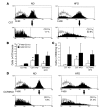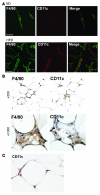Obesity induces a phenotypic switch in adipose tissue macrophage polarization
- PMID: 17200717
- PMCID: PMC1716210
- DOI: 10.1172/JCI29881
Obesity induces a phenotypic switch in adipose tissue macrophage polarization
Abstract
Adipose tissue macrophages (ATMs) infiltrate adipose tissue during obesity and contribute to insulin resistance. We hypothesized that macrophages migrating to adipose tissue upon high-fat feeding may differ from those that reside there under normal diet conditions. To this end, we found a novel F4/80(+)CD11c(+) population of ATMs in adipose tissue of obese mice that was not seen in lean mice. ATMs from lean mice expressed many genes characteristic of M2 or "alternatively activated" macrophages, including Ym1, arginase 1, and Il10. Diet-induced obesity decreased expression of these genes in ATMs while increasing expression of genes such as those encoding TNF-alpha and iNOS that are characteristic of M1 or "classically activated" macrophages. Interestingly, ATMs from obese C-C motif chemokine receptor 2-KO (Ccr2-KO) mice express M2 markers at levels similar to those from lean mice. The antiinflammatory cytokine IL-10, which was overexpressed in ATMs from lean mice, protected adipocytes from TNF-alpha-induced insulin resistance. Thus, diet-induced obesity leads to a shift in the activation state of ATMs from an M2-polarized state in lean animals that may protect adipocytes from inflammation to an M1 proinflammatory state that contributes to insulin resistance.
Figures








Comment in
-
Macrophage heterogeneity and tissue lipids.J Clin Invest. 2007 Jan;117(1):89-93. doi: 10.1172/JCI30992. J Clin Invest. 2007. PMID: 17200712 Free PMC article.
References
-
- Greenberg A.S., Obin M.S. Obesity and the role of adipose tissue in inflammation and metabolism. Am. J. Clin. Nutr. 2006;83:461S–465S. - PubMed
-
- Cancello R., et al. Reduction of macrophage infiltration and chemoattractant gene expression changes in white adipose tissue of morbidly obese subjects after surgery-induced weight loss. Diabetes. 2005;54:2277–2286. - PubMed
Publication types
MeSH terms
Substances
Grants and funding
LinkOut - more resources
Full Text Sources
Other Literature Sources
Medical
Molecular Biology Databases
Research Materials
Miscellaneous

